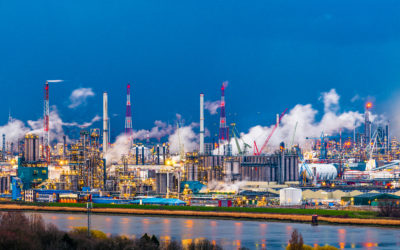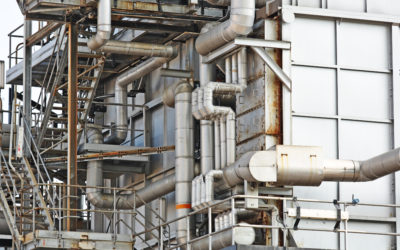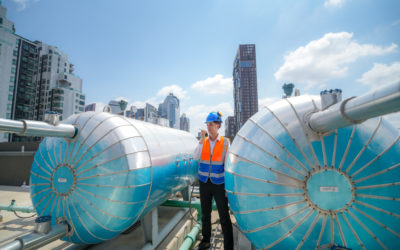Fighting Scale and Corrosion on Geothermal Plant Equipment: Addressing Challenges in Harsh Environments
Geothermal energy, harnessed from the Earth’s natural heat, is a sustainable and reliable source of power. However, much has been written about the extremely harsh environments in which geothermal plants operate and how those environments present significant challenges, particularly in the form of scale and corrosion on equipment. These issues not only threaten the efficiency and longevity of geothermal systems but also drive up operational costs. Understanding the causes of scale and corrosion, as well as the impact they have on geothermal equipment, is essential for optimizing plant performance and ensuring the longterm viability of geothermal energy production.
Extreme Geothermal Environments
Geothermal plants operate in environments characterized by high temperatures, aggressive chemical compositions, and varying pressures. These extreme conditions, while necessary for extracting geothermal energy, also create a perfect storm for scale formation and corrosion. Scale, a hard mineral deposit, and corrosion, the gradual degradation of metal, are common byproducts of geothermal energy production. Together, they pose a serious threat to the functionality and efficiency of geothermal equipment.
The geothermal fluid used in energy extraction also contains dissolved minerals such as silica, calcium, and magnesium. As the fluid is brought to the surface and cooled, these minerals precipitate out of solution and form scale deposits on equipment surfaces. Scale can accumulate rapidly, leading to blockages in pipes, reduced heat transfer efficiency, and increased energy consumption. Moreover, the presence of scale can exacerbate corrosion by creating localized areas of high acidity, further damaging the equipment.
Corrosion in Geothermal Plants
Corrosion in geothermal plants is a pervasive issue due to the aggressive nature of the geothermal fluids. These fluids often contain high concentrations of dissolved gases such as carbon dioxide (CO2), hydrogen sulfide (H2S), and other corrosive compounds. When these gases come into contact with metal surfaces, they can initiate chemical reactions that lead to the deterioration of the material. Over time, this corrosion can compromise the structural integrity of pipes, heat exchangers, and other critical components, resulting in leaks, equipment failure, and costly repairs.
One of the most challenging aspects of managing corrosion in geothermal plants is the variability of the geothermal resource. The composition of the geothermal fluid can change depending on the location and depth of the resource, making it difficult to predict and control corrosion rates. Additionally, the high temperatures and pressures associated with geothermal operations can accelerate corrosion processes, further complicating efforts to protect equipment.

Economic Implications of Scale and Corrosion
The economic impact of scale and corrosion in geothermal plants is substantial. As scale builds up on heat exchangers, pipes, and other equipment, it reduces the efficiency of heat transfer processes, forcing the plant to consume more energy to maintain production levels. This inefficiency not only drives up operational costs but also reduces the overall output of the plant, affecting its profitability.
Corrosion, on the other hand, can lead to unexpected equipment failures, requiring costly repairs or replacements. The downtime associated with these repairs further exacerbates financial losses, as the plant is unable to generate power while equipment is offline. In severe cases, corrosion can lead to catastrophic failures that jeopardize the safety of the plant and its workers.
Given these challenges, it is clear that mitigating scale and corrosion is essential for the long-term success of geothermal energy production. Plant operators must implement effective strategies to protect their equipment and maintain efficient operations in the face of these harsh conditions.
HeatX Nanocomposite: A Solution to Scale and Corrosion Challenges
To combat the persistent issues of scale and corrosion, geothermal plants can turn to advanced materials and coatings designed to enhance the durability and efficiency of their equipment. A novel, next-generation material solution is HeatX nanocomposite surface treatment, which offers superior omniphobic protection against both scale formation and corrosion.
HeatX nanocomposite creates a highly resistant, ultra low surface energy nano barrier on equipment surfaces, repelling the adhesion of scale deposits and minimizing the chemical interactions that lead to corrosion. By applying HeatX, geothermal plants can significantly extend the lifespan of their equipment, reduce the frequency of maintenance shutdowns, and improve overall operational efficiency.
Moreover, the HeatX’s ability to maintain performance in extreme geothermal environments translates to substantial cost savings. With less frequent maintenance and fewer equipment failures, geothermal plants can optimize their operations, ensuring a more consistent and reliable energy output.
Addressing the challenges of scale and corrosion in geothermal plants is critical for maintaining the efficiency and profitability of geothermal energy production. By leveraging a next-generation innovation, plant operators can protect their equipment, enhance operational efficiency, and ultimately reduce costs, with HeatX nanocomposite, thereby ensuring the long-term viability of geothermal power as a sustainable energy source. Get in touch with our team to learn more:



